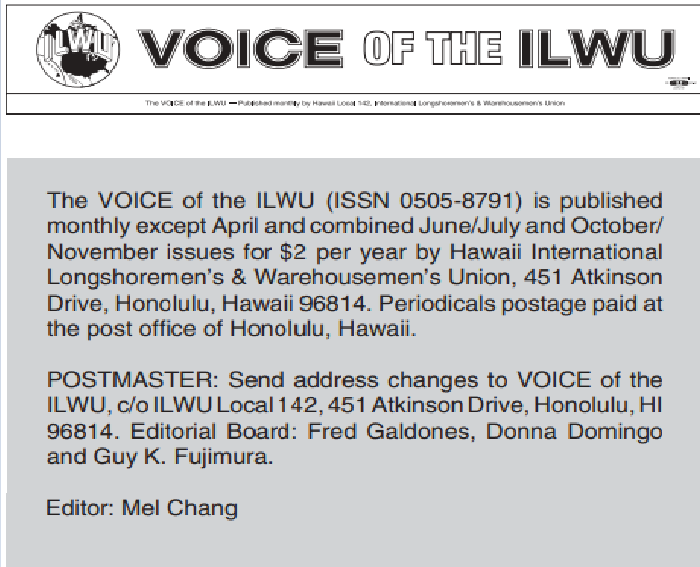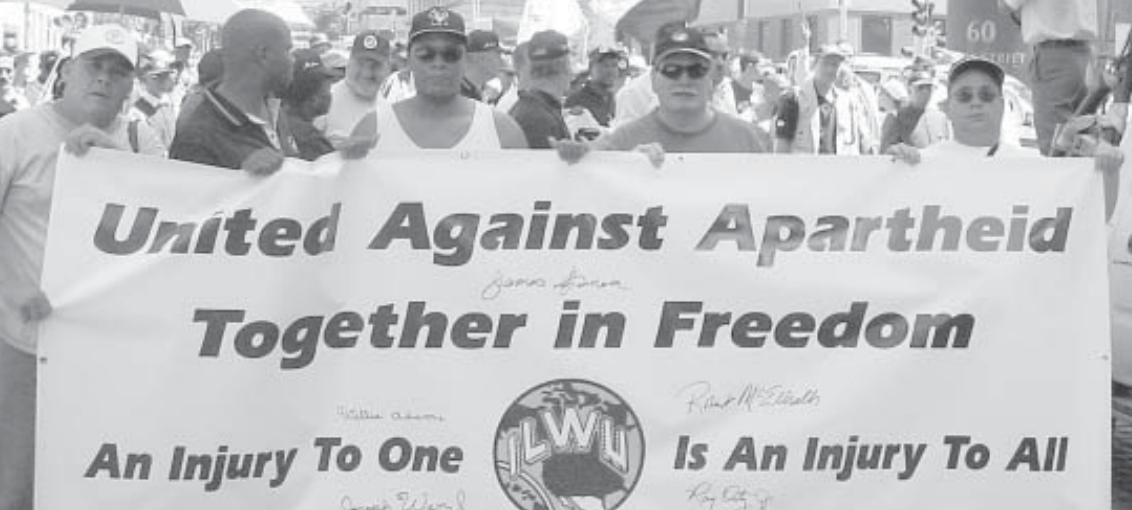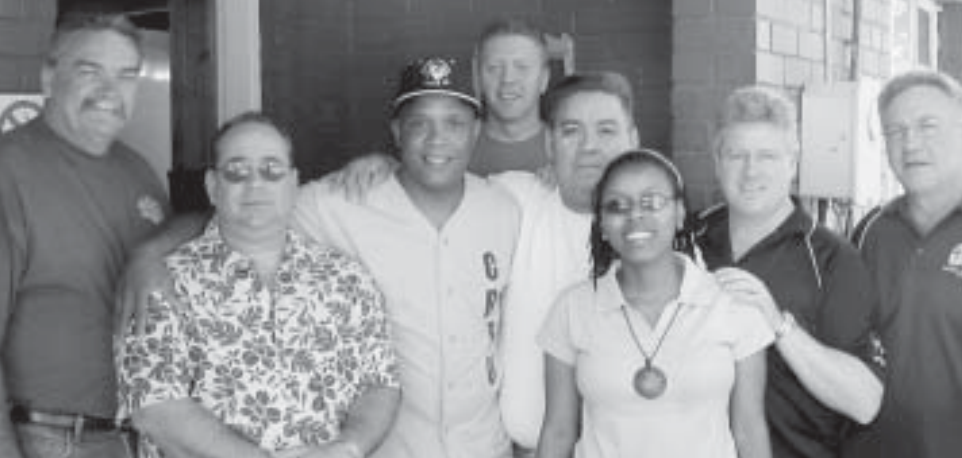The ILWU sent three delegates to represent the union in South Africa at the tenth year commemoration of the end of apartheid and at an international mine workers conference last November.
International Secretary-Treasurer Willie Adams, International Executive Board member Trinidad Esquival (representing the Southern California mining Local 30 in Boron) and Mike Diller (president of Local 20 that processes and packages the mined borax products for export in Wilmington) made the 20-hour flight to Johannesburg with excitement and anticipation. The parade celebrating the end of South Africa’s institutional system of racism and segregation and the beginnings of its democracy was the highlight of the trip for the ILWU delegation. It was a victory not just for the people of South Africa, but for the ILWU as well, which was very involved in the international movement to take down the old regime through its boycotts of South African ships and other actions.
The South Africans themselves recognized the union’s central role in the struggle by asking the ILWU delegation to lead the march through the streets of Johannesburg. They carried a banner proclaiming “United Against Apartheid/Together in Freedom/An injury to one is an injury to all” along with the ILWU insignia and signed by the Titled Officers and the Coast Committee.
Adams was transported by the experience.
“I felt like we were riding on the wings of angels,” he said. “Especially hearing the feet on the pavement. I thought to myself, ‘This is what Martin Luther King Jr. must have felt like on the march to Selma.’ The ILWU had pushed the fight against apartheid, so it couldn’t have been more fitting for us to be there out front. People were coming out of the buildings and onto the streets to join the parade. It doesn’t get much better than that.”
After the parade Adams, Diller and Esquival gave their banner to the African National Congress (ANC), Nelson Mandela’s organization that led much of the fight against apartheid. It now hangs in the ANC headquarters.
As time allowed the ILWU delegates also visited the black township of Soweto, where much of the revolutionary movement was sparked, and the modest home of Nelson Mandela before he was jailed by the repressive government. The house has since been transformed into a museum of apartheid, a remembrance of a brutality that reigned not far in the past.

“It was a very somber experience,” Diller said.
The humble structure also houses numerous plaques, memorabilia and awards Mandela received over the years, including Sugar Ray Leonard’s welter weight boxing belt.
“Sugar Ray was so moved by Mandela he gave him his championship belt,” Adams said, noting that Mandela had been a boxer himself in his younger days.
In the two days prior to the parade the ILWU delegates attended the World Conference for the Mining Industry hosted by the 20 million member International Federation of Chemical, Energy, Mining and General Workers Union (ICEM). Representatives from mining unions around the world gathered to support each other in their struggles against international mining conglomerates. For example, Rio Tinto, the company that employs ILWU Local 3 borax miners in the Southern California desert and the Local 20 chemical processing and packaging workers at the Port of Los Angeles, is the largest mining company in the world and is notorious for its antiunion activities in South Africa, Australia and many other countries.
At the conference we learned that Rio Tinto has joined groups like the International Council for Mining and Minerals (ICMM) to make themselves look good throughout the world,” Esquival said. “But Rio Tinto has yet to sign on to global agreements to better the lives of working people.”
As part of the ICEM’s four-year work plan, the conference called for “meaningful, inclusive and regular social dialogue” with employers at the highest level and with the employer group ICMM to monitor basic international standards set by the United Nation’s International Labour Organization. The plan also calls for a campaign to get all countries with mining interests to ratify ILO Convention 176 on Mine Health and Safety; to move forward to implement ILWU Convention 162 on employment and social impacts of a ban on asbestos mining; to use the global union federation and global agreements to unite and organize workers worldwide; and to continue to build local partnerships in mineral extraction areas in the fight against HIV/AIDS.

Marching in the streets of Johannesburg. Far left, International Executive Board member Trinidad Esquival; center, International Secretary-Treasurer Willie Adams; and far right, ILWU Local 20 President Mike Diller.
Another part of the work plan calls for the mining industry to meet the human needs of its workers, families and communities. It sends a clear message to both private and public financing organizations that the “onesize-fits-all” mine privatization and restructuring model is unacceptable. Citing a record of social devastation in countries that have rapidly liberalized mining enterprises, the work plan warns such financing bodies “that the unilateral imposition of any restructuring that is not socially sustainable is bound to fail.”
The work plan concludes with a resolve condemning the invasion of Iraq, and a call to the international community for early elections in Iraq and for withdrawal of all occupying forces. The plan also calls for immediate action toward a just settlement of the Palestine-Israel conflict that includes an independent and viable Palestine state.
“I left Johannesburg with a tremendous feeling of solidarity with our brothers and sisters throughout the world who belong to the labor movement,” Diller said. “The delegates want us to end the war in Iraq. They love our people, but hate George Bush and the policies he stands for.”
Adams, who attended the last ICEM conference in Australia in 2002 along with Director of International Affairs Ray Familathe, was pleased with the delegation’s short but productive trip, solidifying the ILWU’s relations with other workers and planning further collaborations.
“We were where we needed to be, getting done what we needed to do,” he said. “Our visit also laid the groundwork for the Maritime and Mining Conference the ILWU will be hosting in Southern California in May.” ◆

At the Mandela House Museum: (L-r) Keith McCorriston, MUA Branch deputy secretary for Western Australia, ILWU Local 20 President Mike Diller, ILWU International Secretary-Treasurer Willie Adams, ILWU International Executive Board member Trinidad Esquival, the Mandela Museum curator and three Australian miners.
